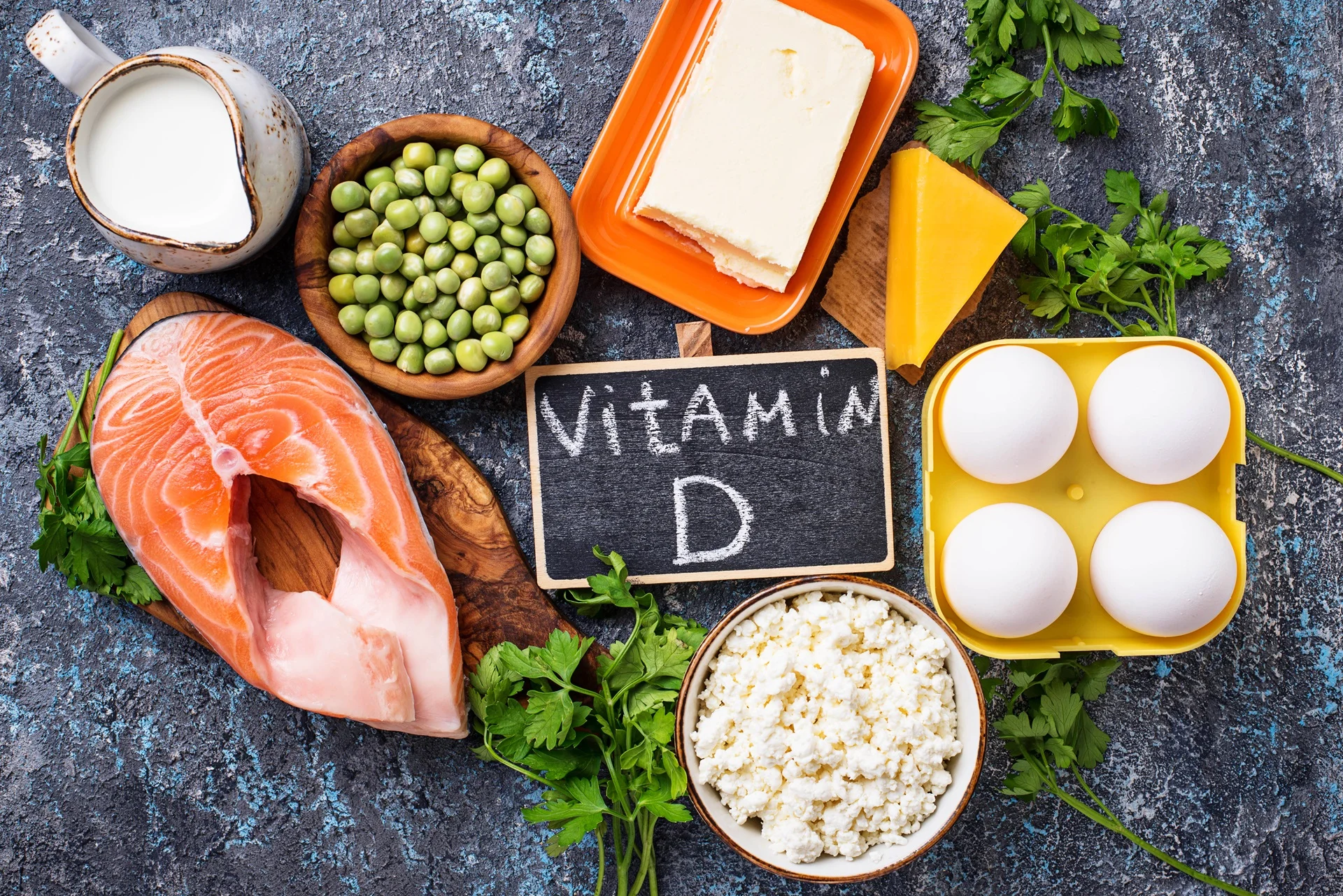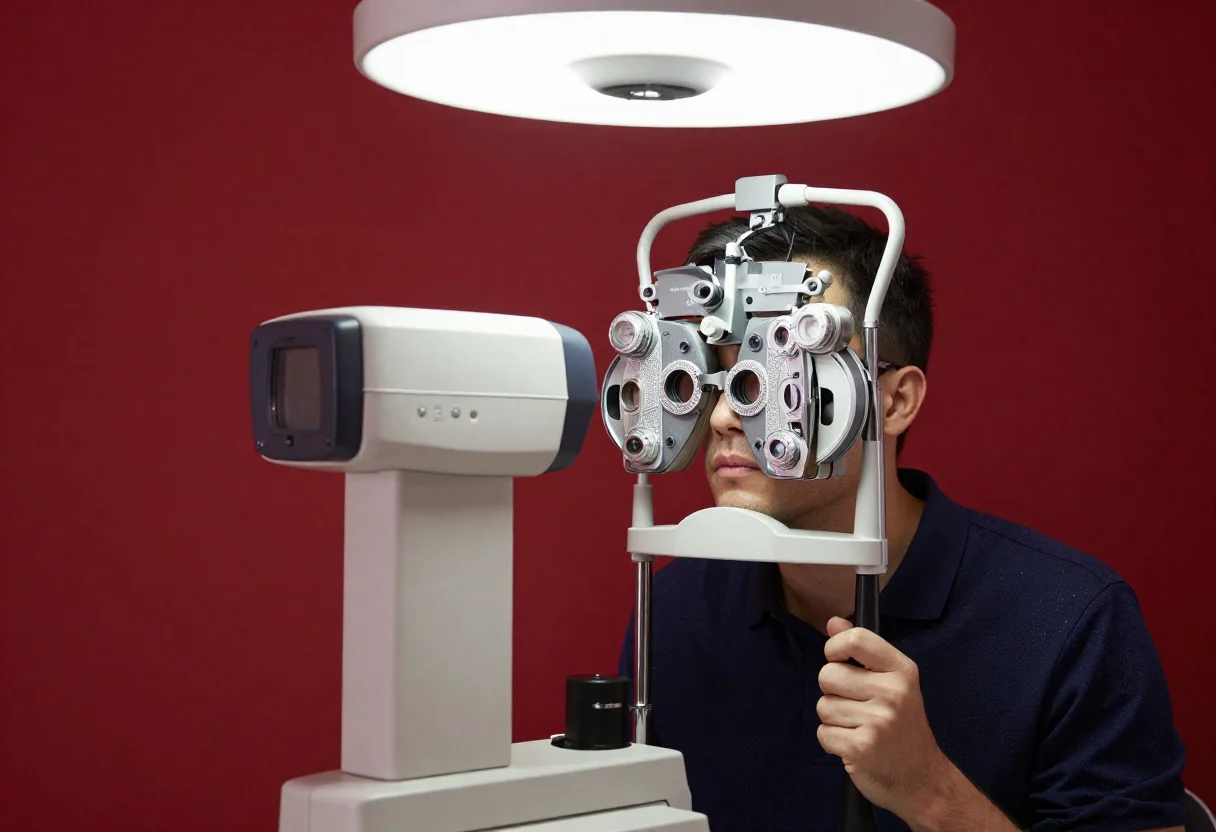
Vitamin D (also known as calciferol) is a fat-soluble vitamin naturally present in some foods, added to others, and available as a dietary supplement. It is an essential nutrient for the body, playing key roles such as maintaining bone health, supporting immune system function, and regulating cell growth. Often referred to as the 'sunshine vitamin,' vitamin D is produced by the skin when exposed to sunlight. It is also found in foods such as fish oil, dairy products, and egg yolks.
Vitamin D exists in two main forms, D2 (ergocalciferol) and D3 (cholecalciferol). Vitamin D2 is obtained from the diet, mostly from fungi but also from plants, and is often used in supplements. Fish such as trout, salmon, tuna, and mackerel can also provide some of the vitamin D needed. Vitamin D3 can be obtained from the diet (from animal products) or synthesized in the skin by converting the cholesterol precursor 7-dehydrocholesterol after exposure to sufficient sunlight, i.e. ultraviolet B (UVB) radiation.
Sun exposure for vitamin D synthesis can only be effective when the angle of the sun's rays is greater than 45°. As a result, those living in the northern hemisphere do not get enough vitamin D through skin synthesis during the winter months, and in some northern regions, low sun exposure can last up to 6 months of the year. To increase vitamin D intake, some countries have implemented a policy of fortifying dairy products and margarine with vitamin D. At the same time, using light bulbs for artificial UVB exposure is another way to increase vitamin D synthesis.
The main source of vitamin D for humans is from 7-dehydrocholesterol, the precursor of vitamin D synthesis in the skin from sunlight (UVB rays), while natural food sources of vitamin D (e.g. fish or mushrooms) play only a minor role in overall vitamin D intake.
Bone Health
- Vitamin D promotes the formation, strengthening, and protection of bones and teeth by increasing the absorption of calcium and phosphorus from the intestines.
- In combination with calcium, it helps prevent older adults from suffering from osteoporosis.
- It maintains sufficient serum calcium and phosphate levels to prevent hypocalcemic tetany (involuntary muscle contraction, leading to cramps and spasms) by increasing calcium absorption in the intestine. It is also necessary for bone mineralization and bone remodeling by osteoblasts and osteoclasts.
Muscle Function
- Vitamin D has a significant role in muscle health. Recent studies show that this vitamin helps in the maintenance and regeneration of muscle tissue. Vitamin D ensures the continuation of repair through the receptors found in muscle tissue. Furthermore, it shows positive effects on mitochondrial health, which supports the regeneration of muscle tissue after muscle damage.
- Some studies conducted on middle-aged and elderly individuals show that Vitamin D can increase muscle strength. There are consistent effects, especially in the muscle strength of the extremities. However, the effects on muscle strength can vary depending on individual factors; these variables include the level of physical activity, Vitamin D status, and the type of exercise.
Immune System
- Vitamin D is an important immune system regulator, affecting the immune system in both innate and adaptive immune processes.
- Vitamin D specifically regulates T and B cells. It suppresses T-cell proliferation and reduces the production of pro-inflammatory cytokines. This generally has an anti-inflammatory effect.
- In B cells, it suppresses immunoglobulin production and B cell proliferation, which is important in reducing the risk of autoimmune diseases. Furthermore, it acts on macrophages and regulates their cytokine production and cell turnover processes.
Cardiovascular Health
- Vitamin D deficiency has been found to be closely associated with cardiovascular diseases, especially coronary artery disease, heart failure, and atrial fibrillation.
- Low Vitamin D levels are linked to cardiovascular problems such as arterial stiffness, hypertension, and atherosclerosis. It has also been observed that patients with Vitamin D deficiency have worse prognoses and an increased frequency of heart attacks and other cardiovascular events.
- However, the effect of Vitamin D supplements on heart health is still controversial. While some studies suggest that Vitamin D supplementation reduces cardiovascular risks, some clinical trials do not support this relationship. The reason for this is that the complex interactions between Vitamin D metabolism and cardiovascular effects are not fully understood. In summary, Vitamin D deficiency can negatively affect cardiovascular health, but more clinical research is needed on this topic.
Effects on Cancer
- According to research, Vitamin D can show both protective and therapeutic effects on cancer. Vitamin D deficiency has been linked to various cancer types, especially breast, colon, prostate, and lung cancer. Adequate Vitamin D levels are associated with lower mortality rates and improved survival rates in some cancer types. In particular, Vitamin D supplementation has been observed to reduce cancer recurrence and mortality in some patients, but inconsistent results also exist. Therefore, more clinical research is needed.
Mental Health
- Vitamin D has an important role in mental health. Research indicates that Vitamin D deficiency is associated with depression and that sufficient Vitamin D levels can support mental health. Studies conducted in the last 5 years have found that Vitamin D supplementation can help alleviate symptoms of depression, with positive effects, especially in older adults and individuals predisposed to depression. For example, one study showed that individuals taking Vitamin D supplements experienced a significant reduction in depression symptoms. These effects have been linked to a reduction in pro-inflammatory biomarkers (such as IL-6, IL-1β), as these inflammation molecules are connected to depression.
- Additionally, another study conducted on older adults found that individuals with Vitamin D deficiency had a higher risk of depression. These studies reveal that Vitamin D plays a crucial role in regulating brain functions and mood.
- In conclusion, Vitamin D supplementation, especially in individuals experiencing deficiency, can provide positive effects in reducing depression symptoms and overall improvement in mental health.
Effects on Metabolism
- Vitamin D is a vitamin that shows significant effects on metabolism. Research has revealed that Vitamin D can reduce the risk of metabolic syndrome, insulin resistance, and type 2 diabetes. Especially in pre-diabetic patients, Vitamin D supplementation has been observed to reduce the progression to type 2 diabetes by 10%.
- Furthermore, Vitamin D deficiency has been associated with components of metabolic syndrome, namely hypertension, obesity, and dyslipidemia. Sufficient Vitamin D levels can provide positive effects on overall metabolic health and alleviate such risk factors. It is specifically thought that Vitamin D metabolites may affect mechanisms such as blood sugar regulation and insulin sensitivity. However, more intervention studies are needed to fully prove these relationships in terms of cause and effect.
Vitamin D deficiency can occur when the body does not produce enough vitamin D, does not get enough sunlight, or does not get enough vitamin D from the diet. Vitamin D insufficiency or deficiency has been described as very common condition in the general population and some authors use the terms “vitamin D deficiency epidemic or pandemic”:
Symptoms:
Bone and muscle pain: Vitamin D deficiency affects the absorption of calcium, which can lead to muscle weakness and bone pain.
Fatigue and weakness: Low vitamin D levels are associated with a lack of energy and can cause fatigue and weakness.
Frequent infections: Vitamin D helps the immune system to function properly; a deficiency can cause you to get sick more often.
Depression and mood disorders: Several studies suggest a link between low vitamin D levels and depression.
Bone loss (osteoporosis) and fracture risk: Vitamin D deficiency can reduce bone density, especially in older people, which increases the risk of fractures.
Risks:
Obesity and some chronic diseases: Obesity causes vitamin D to become trapped in fat cells, which lowers its circulating levels. In addition, certain medical conditions such as Crohn's disease, celiac disease, and kidney failure also negatively affect the body's absorption of vitamin D.
Age and dark skin color: As we age, the skin loses its capacity to produce vitamin D from sunlight. In addition, dark-skinned individuals have more difficulty producing vitamin D due to the excess melanin pigment.
Prevention and treatment of vitamin D deficiency is usually achieved through adequate sunlight exposure and dietary supplements. Exposure to UV-B rays is especially important to promote vitamin D synthesis through the skin. In addition, vitamin D supplements are recommended, especially for high-risk groups.
Over the last 5 years, studies have shown that low vitamin D levels are associated with autoimmune diseases, infections, and increased susceptibility to respiratory diseases such as COVID-19. Vitamin D supplementation in particular has been found to help reduce inflammatory markers and balance immune system responses.
Prevention and Treatment Methods:
Exposure to sunlight: Getting 15-30 minutes of sunlight at least 2-3 times a week, especially in summer, is effective in increasing vitamin D levels. However, over-exposure should be avoided, taking into account the risks of sunlight.
Dietary supplements: Foods such as oily fish, egg yolks, and fortified dairy products can contribute to vitamin D intake, but the amount from food is usually limited.
Vitamin D supplements: Table 2 shows the daily amounts of vitamin D that the Food and Nutrition Board (FNB) of the American National Academies of Sciences, Engineering, and Medicine has determined to be adequate daily intakes to maintain bone health and normal calcium metabolism in healthy individuals.
Age group
Recommended daily amount of vitamin D
Babies under 1 years old
10 microgram (mcg) (equivalent to 400 international units (IU))
1-70 years old
15 mcg (600 IU)
70 years old and older
20 mcg (800 IU)
These methods can contribute to bone health as well as support the functioning of the immune system. People at high risk (the elderly, people who are not exposed to enough sunlight and pregnant women) should have their vitamin D levels checked regularly.
The biggest risk of excessive vitamin D intake is the abnormal increase in blood calcium levels (hypercalcemia) and the associated health problems. Vitamin D toxicity typically occurs with the consumption of very high doses of supplements, as it is not caused by sunlight exposure or dietary intake.
Symptoms include nausea, vomiting, loss of appetite, constipation, excessive thirst, frequent urination, muscle weakness, fatigue, and kidney stone formation. Prolonged high calcium levels can lead to more severe complications such as kidney damage and bone pain. Neurological effects like confusion, drowsiness, and even coma may occur. In the cardiovascular system, high blood pressure and arrhythmias may develop.
To prevent vitamin D toxicity, it is essential to take supplements under medical supervision and monitor vitamin D levels through blood tests.
1. Akutsu T, et al., Vitamin D and Cancer Survival: Does Vitamin D Supplementation Improve the Survival of Patients with Cancer? (2020).
2. Anglin RES, et al., Vitamin D deficiency and depression in adults: systematic review and meta-analysis. (2013).
3. Antony Dhanapal ACT and Vimaleswaran KS, Vitamin D supplementation and immune related markers: an update from nutrigenetic and nutrigenomic studies. (2022).
4. Bouillon R, Comparative analysis of nutritional guidelines for vitamin D. (2017).
5. Bouillon R, et al., The health effects of vitamin D supplementation: evidence from
human studies. (2022).
6. Charoenngam N and Holick MF, Immunologic Effects of Vitamin D on Human Health and Disease. (2020).https://www.mdpi.com/2072-6643/12/7/2097
7. Cosentino N, et al., Vitamin D and Cardiovascular Disease: Current Evidence and
Future Perspectives. (2021).
8. Kaviani M, et al., Effects of vitamin D supplementation on depression and some selected pro-inflammatory biomarkers: a double-blind randomized clinical trial. (2022).
9. de Koning EJ, et al., Vitamin D supplementation to prevent depression and poor physical function in older adults: Study protocol of the D-Vitaal study, a randomized placebo-controlled clinical trial. (2015).
10. Latham CM, et al., Vitamin D Promotes Skeletal Muscle Regeneration and Mitochondrial Health. (2021).
11. LeBoff MS and Bischoff-Ferrari HA, The Effects of Vitamin D Supplementation on Musculoskeletal Health: The VITAL and DO-Health Trials. (2023).
12. MARUOTTI N and CANTATORE FP, Vitamin D and the Immune System. (2010).
13. Nardin M, et al., Vitamin D and Cardiovascular Diseases: From Physiology to Pathophysiology and Outcomes. (2024).
14. Pludowski P, et al., Vitamin D Supplementation: A Review of the Evidence Arguing for a Daily Dose of 2000 International Units (50 µg) of Vitamin D for Adults in the General Population. (2024).
15. Qi P, et al., Effects of vitamin D supplementation on muscle strength in middle-aged and elderly individuals: a retrospective, propensity score-matched study. (2024).
16. Rebelos E, Tentolouris N, and Jude E, The Role of Vitamin D in Health and Disease: A Narrative Review on the Mechanisms Linking Vitamin D with Disease and the Effects of Supplementation. (2023).
17. Saponaro F, Marcocci C, and Zucchi R, Vitamin D status and cardiovascular outcome. (2019).















